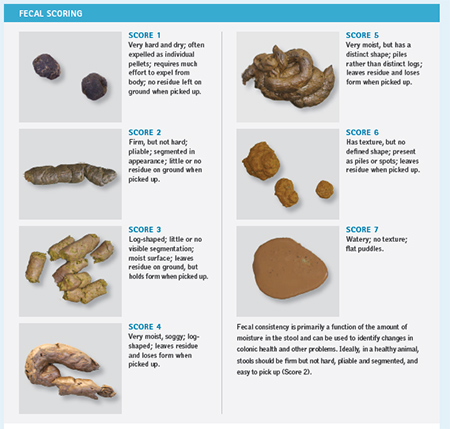What is Diarrhea?

What is Diarrhea?
At first glance, this may seem like a silly question because, well, doesn’t everyone know what diarrhea is? Au contraire. Among the pet families I see, the definition of diarrhea seems to be a bit “loose.”
Doctor Definition
I got out my 15 pound textbook of internal medicine to copy a scientific definition. Diarrhea is simply too much water in the stool. This excess water occurs when the colon cannot absorb water from the stool as it transits through the large bowel. Excess secretion of water by the large intestine can also cause diarrhea. Parvovirus infection results in some of the most severe and bloody diarrhea seen in veterinary practice. This virus damages the small intestine, allowing massive fluid loss into the lumen, overwhelming the absorptive capacity of the large intestine. Whipworms, a common large intestinal parasite, cause a watery stool because of the presence of increased mucus and blood as a result of the worm infestation.
Pet Family Definition

On either end of the stool spectrum, fecal abnormalities are easy to recognize. Constipation produces hard, dry pellets of stool and parvovirus results in pools of watery diarrhea. But in between those two ends of the spectrum lies an area of varying perceptions regarding what is and is not diarrhea. In order to standardize discussions of diarrhea, veterinarians have developed several different fecal scoring scales. One of the most commonly used is shown here. Using the 7 point scale, a 2 or 3 are considered normal. For many city dwellers who must legally pick up their dog’s feces, number 3 leaves a residue on the sidewalk, causing owners to erroneously consider fecal score number 3 diarrhea.
When is Diarrhea a Problem?
Medically, I might not be too concerned until the stool gets to a fecal score of 5, but what else is going on with that pet will factor into my recommendation. For example, a fecal score of 4 with significant weight loss would be a serious issue for that pet. Soft stool accompanied by vomiting and a poor appetite lasting more than a couple of days is concerning, as is stool with persistent blood. Fever accompanied by diarrhea is also cause for alarm. Recurrent bouts of diarrhea suggest a medical problem like intestinal parasites or pancreatitis.
Preventing Diarrhea
Many cases of diarrhea can be prevented. Here’s how:
- Feed a consistent diet
- Limit rich treats like bacon and other human foods
- Keep the trash secured if you have a garbage hound dog
- Have your pet tested annually for intestinal parasites
- Follow your veterinarian’s recommendations for vaccination to protect against parvovirus and other diarrhea-causing infections
- Administer monthly heartworm preventative, which also prevents some intestinal parasites

































